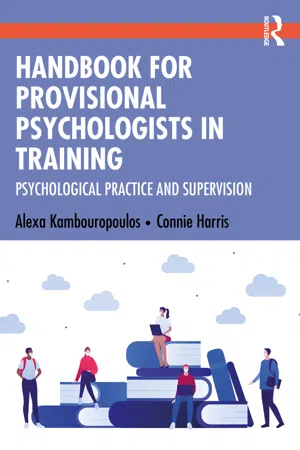
Handbook for Provisional Psychologists in Training
Psychological Practice and Supervision
- 194 pages
- English
- ePUB (mobile friendly)
- Available on iOS & Android
Handbook for Provisional Psychologists in Training
Psychological Practice and Supervision
About this book
This book provides provisional psychologists in training with a comprehensive and practical understanding of the specific skills and competencies required in the profession, during placement and beyond, in varied settings.
Handbook for Provisional Psychologists in Training supports the personal and professional development of provisional psychologists undertaking the Master of Professional Psychology and brings together current research findings with practical insights and resources. It covers all aspects of practice for trainees, such as establishing professional relationships and maintaining professional boundaries, applying evidence-based theory to practice, utilisation of psychological treatments, communicating with clients about treatment, making referrals and self-reflective practice. It also enables provisional psychologists to prepare for psychological practice in varied settings, including working with children, adults, and diverse populations.
This book will be helpful to all provisional psychologists but particularly those undertaking the Master of Professional Psychology 5+1 pathway.
Frequently asked questions
- Essential is ideal for learners and professionals who enjoy exploring a wide range of subjects. Access the Essential Library with 800,000+ trusted titles and best-sellers across business, personal growth, and the humanities. Includes unlimited reading time and Standard Read Aloud voice.
- Complete: Perfect for advanced learners and researchers needing full, unrestricted access. Unlock 1.4M+ books across hundreds of subjects, including academic and specialized titles. The Complete Plan also includes advanced features like Premium Read Aloud and Research Assistant.
Please note we cannot support devices running on iOS 13 and Android 7 or earlier. Learn more about using the app.
Information
1Preparing for psychological practice
1.1 Introduction
- How to define your role as a provisional psychologist at placement
- Developing a good understanding of the service delivery procedures, such as the referral process, types of forms required before commencement of therapy such as consent, confidentiality, and release of information
- How to write client case notes using various methods such as SOAP and/or PROC
- Completing logbooks satisfactorily to satisfy APAC and PsyBA requirements
- How to prepare for mid and final placement performance reviews
- How to terminate clients
1.2 Precourse preparation
1.2.1 Provisional registration
1.2.2 Police check
1.2.3 Working with Children Check
1.3 Practicum preparation
1.3.1 Guide to applying for placement
1.3.2 Preparing cover letter
- Demonstrate an understanding of the work conducted at the agency/school
- Suggest how this placement could enhance your practical training
- What you bring to the situation/placement
- What you hope to gain from being placed there
1.3.3 Preparing the curriculum vitae
1.3.3 Preparing for the interview
- Find out as much information as possible about the agency/school that you have applied to and have a very good understanding of what particularly attracted you to this placement. For example, is it the type of services it offers to clients; the presentations of clients and/or age group of which you are keen to work with? Or is it the mission and v...
Table of contents
- Cover
- Endorsement
- Half-Title Page
- Title Page
- Copyright Page
- Dedication
- Table of Contents
- List of Figures
- List of Tables
- Preface
- 1 Preparing for psychological practice
- 2 Working with children in schools
- 3 Working with adults
- 4 Working within diverse contexts
- 5 Supervision
- 6 Managing professional and personal risks
- 7 The Psychology Board of Australia +1 internship program
- 8 Life after registration
- Index